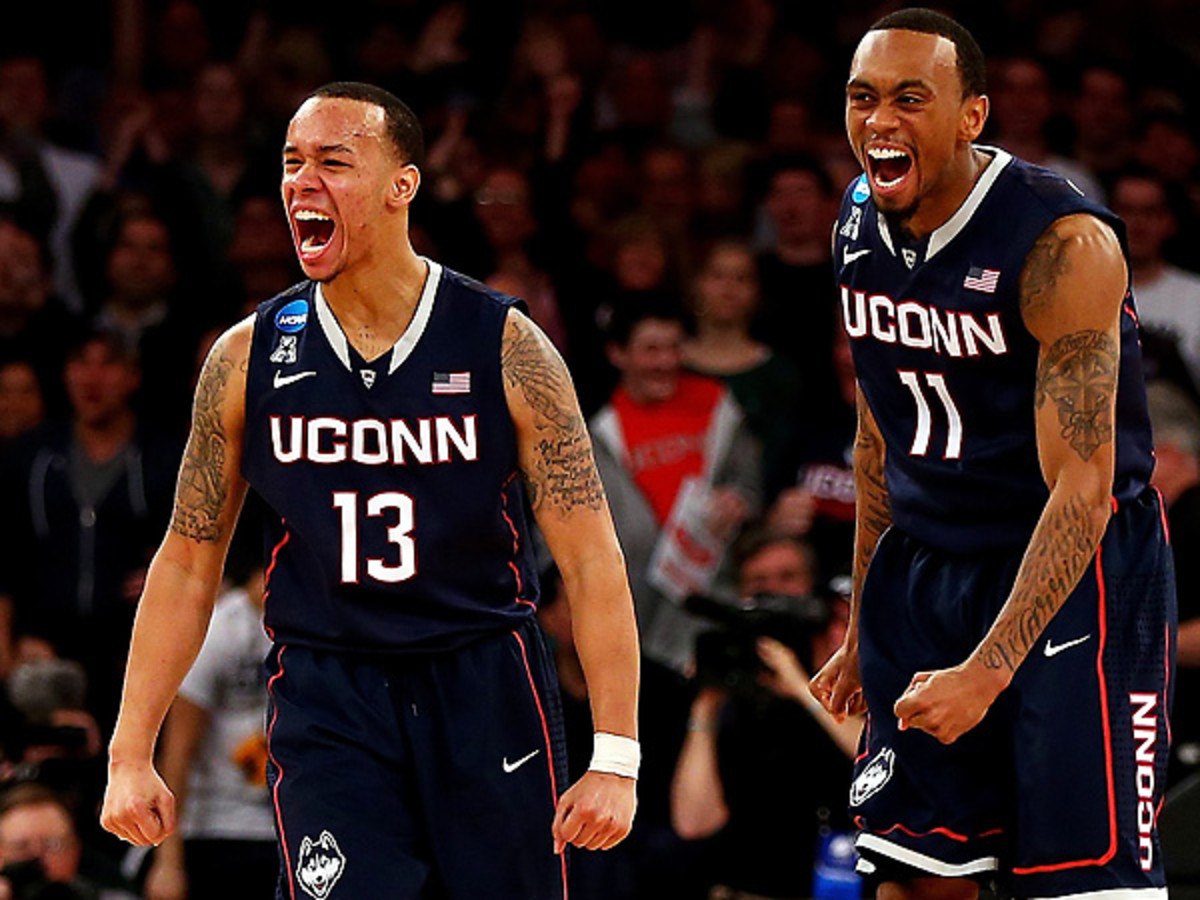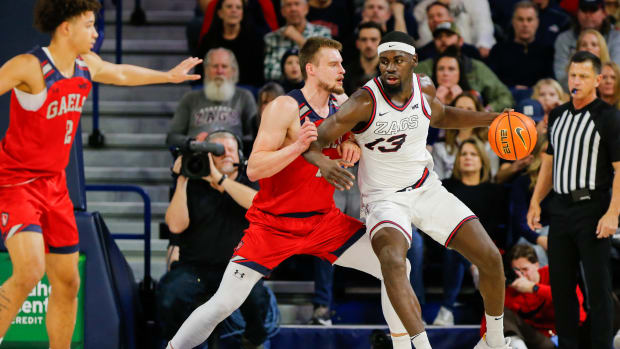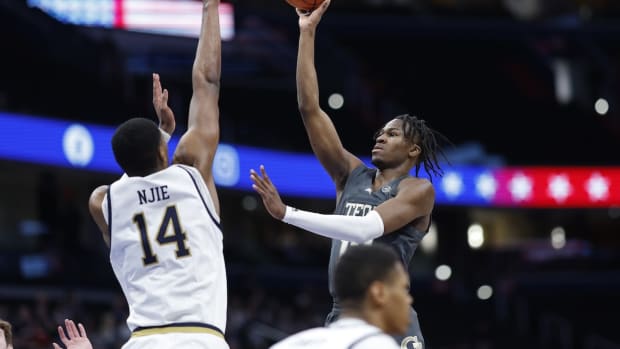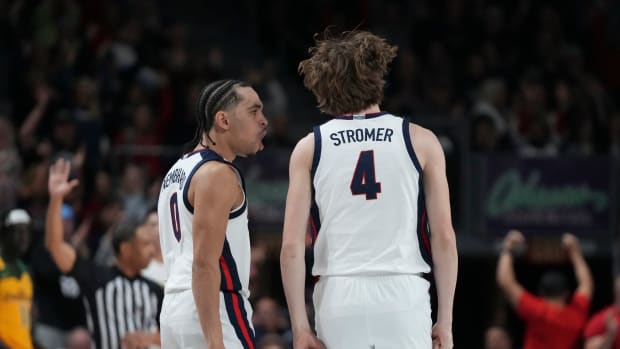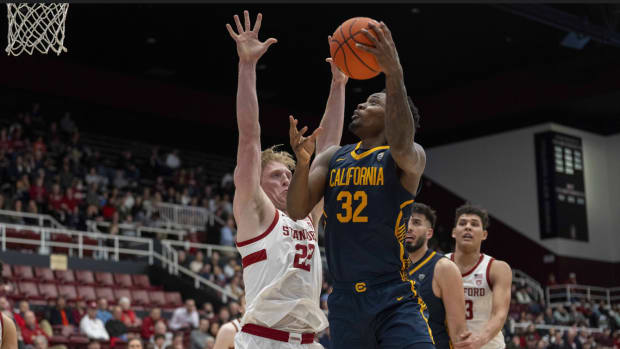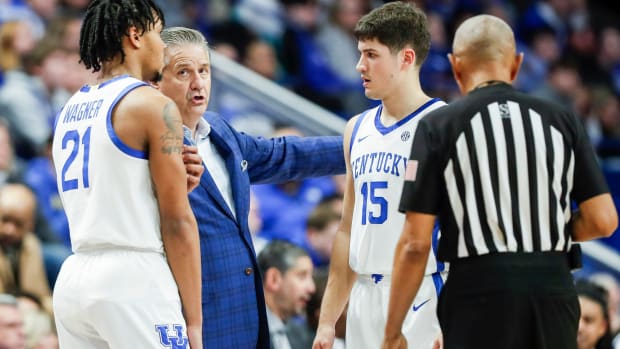Final Four keys: How each team can advance to the title game
Shabazz Napier (13) and Ryan Boatright were the keys to UConn's upset of Michigan State. (Elsa/Getty Images)
ARLINGTON, Texas – The Final Four games begin Saturday – finally – and Connecticut, Florida, Wisconsin and Kentucky all will have a checklist of things to accomplish that they believe will result in success.
Whether these items are on said checklists or not, who knows, but they should be keys to each team advancing to the national title game on Monday.
Florida-Connecticut
Florida will win if ... The Gators attack the rim with consistency. No one besides Scottie Wilbekin (24 attempts) and Michael Frazier II (26) has truly tried to make an impact from beyond the three-point line. This makes some sense, because Florida is hitting 52.4 percent of its two-point attempts during the NCAA tournament, and why bother increasing the degree of difficulty if that's not necessary? That should be the plan of attack Saturday as well. Connecticut opponents are shooting 48.8 percent on two-point attempts and the Huskies have just 11 blocked shots in four tournament outings. Being patient enough to penetrate may be a chore against a Huskies backcourt known for on-ball pressure, but the idea ought to be getting Patric Young and Will Yeguete into screen-and-roll action while also not settling for long-range looks. “We like to play inside-out,” forward Dorian Finney-Smith said. “Get Pat some touches, get in the paint, create dribble-drives. If we're making shots, great. Otherwise, stay aggressive.”
Connecticut will win if ... Shabazz Napier and Ryan Boatright can disrupt Florida's backcourt. The Gators' two primary ballhandlers – Scottie Wilbekin and Kasey Hill – have 27 asssits against six turnovers in four NCAA tournament games. The Gators, as a team, have 35 turnovers. Meanwhile, Connecticut has forced 55 turnovers in its four games and the opponents' turnover percentages have been 19.4, 22.9, 13.6 and 26.7, respectively. Three of those four numbers are robust enough to suggest offenses having trouble getting into sets and getting to rhythm. The Huskies may not be able to contend with the Gators' frontcourt, but they might not have to as much if their guards harass the ball up and down the court. Boatright, in particular, will be counted on to be aggravating. “He really turned the Michigan State game around,” Huskies coach Kevin Ollie said. “He really puts great pressure on the basketball. That's one of his greatest attributes.”
Wisconsin-Kentucky
Wisconsin will win if ... The Badgers manage something close to a draw on the glass. A frontcourt with a seven-footer (Frank Kaminsky) and some decently sized forwards (Sam Dekker at 6-foot-8, Nigel Hayes at 6-foot-7) can at least approach the general massiveness of Kentucky. In the Sweet 16, Baylor grabbed 26.2 percent of the available offensive rebounds. In the Elite Eight, Arizona snared 34.2 percent. And the Badgers won't have seen an offensive rebounding force like Kentucky, which has had an offensive rebounding percentage of 40 or better in three of four NCAA tournament games – and snagged a whopping 63 percent of the available offensive boards in the Elite Eight against Michigan. If the Badgers can keep the Wildcats at bay and regularly close defensive possessions after one shot, they should be able to cut off one of Kentucky's best offensive lifelines: second opportunities. The Wildcats have 55 offensive rebounds in four tournament games. “They're not afraid to send everyone and they're very strong,” Badgers forward Sam Dekker said “We just have to have a lot of fight, a lot of toughness and a lot of grit.”
Kentucky will win if
